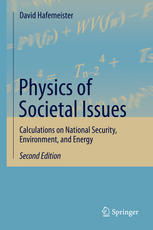

Most ebook files are in PDF format, so you can easily read them using various software such as Foxit Reader or directly on the Google Chrome browser.
Some ebook files are released by publishers in other formats such as .awz, .mobi, .epub, .fb2, etc. You may need to install specific software to read these formats on mobile/PC, such as Calibre.
Please read the tutorial at this link: https://ebookbell.com/faq
We offer FREE conversion to the popular formats you request; however, this may take some time. Therefore, right after payment, please email us, and we will try to provide the service as quickly as possible.
For some exceptional file formats or broken links (if any), please refrain from opening any disputes. Instead, email us first, and we will try to assist within a maximum of 6 hours.
EbookBell Team

5.0
88 reviewsThis book provides the reader with essential tools needed to analyze complex societal issues and demonstrates the transition from physics to modern-day laws and treaties. This second edition features new equation-oriented material and extensive data sets drawing upon current information from experts in their fields. Problems to challenge the reader and extend discussion are presented on three timely issues:
• National Security: Weapons, Offense, Defense, Verification, Nuclear Proliferation, Terrorism
• Environment: Air/Water, Nuclear, Climate Change, EM Fields/Epidemiology
• Energy: Current Energy Situation, Buildings, Solar Buildings, Renewable Energy, Enhanced End-Use Efficiency, Transportation, Economics
Praise for the first edition:
"This insight is needed in Congress and the Executive Branch. Hafemeister, a former Congressional fellow with wide Washington experience, has written a book for physicists, chemists and engineers who want to learn science and policy on weapons, energy, and the environment. Scientists who want to make a difference will want this book."
Richard Scribner, first Director, Congressional Science and
Engineering Fellow Program, AAAS
"Hafemeister shows how much one can understand about nuclear weapons and missile issues through simple back-of-the-envelope calculations. He also provides compact explanations of the partially successful attempts that have been made over the past 60 years to control these weapons of mass destruction. Hopefully, Physics of Societal Issues will help interest a new generation of physicists in continuing this work."
Frank von Hippel, Professor, Princeton, former Assistant Director,
National Security, White House, OSTP
"Energy policy must be quantitative. People who don't calculate economic tradeoffs often champion simplistic hardware. ‘The solution is more... nuclear power, or electric cars, or photovoltaics, etc.’ Some simple physics will show that the true solution matches supply and demand as an ‘integrated resource plan.’ Physics of Societal Issues is a good place to begin this journey."
Arthur Rosenfeld, former California Energy Commissioner,
Professor-emeritus, U. of California-Berkeley